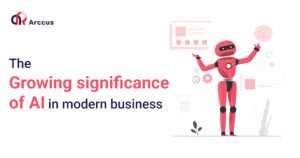How AI Can Improve Your Business

Wondering how AI and the future of business are relatable? We have got all your questions answered in this blog.
AI in Modern Business have emerged marvelously at one and the same time. Since the evolution, Artificial Intelligence (AI) is poised to have a profound and transformative impact on the future of business. It’s gradually integrating into various aspects of business operations.
The growing significance of AI in modern business

The growing significance of AI in modern business is undeniable and has been transforming industries across the globe. Here are several key ways in which AI is making a significant impact on modern businesses:
Enhancing Customer Experience
Artificial Intelligence plays a meaningful role in enhancing customer experiences across varied industries. Here are three of the ways in which AI contributes to improving customer experiences:
Personalized recommendations
AI analyzes customer data, including past interactions, purchase history, and browsing behavior, to create personalized recommendations and content. AI-driven marketing automation tools enable businesses to send personalized marketing messages to individual customers.
Chatbots for customer support
AI-powered chatbots provide immediate assistance to customers, 24/7. Instant and consistent responses, cost efficiency, scalability, feedback collection, personalisation and integration are benefits that chatbots provide for customer support.
AI-driven virtual assistants
AI-driven virtual assistants can provide instant responses to customer inquiries, improving response times and ensuring 24/7 availability. It handles routine customer service tasks such as answering FAQs, processing orders, resolving common issues and making a personalized user experience.
Data Analysis and Insights
Artificial Intelligence conducts data analysis and insights by automating and enhancing various aspects of the data analysis process. Here are the three ways in which AI helps with data analysis and generating insights:
-
Predictive analytics
AI models can be trained to make predictions and forecasts based on historical data, helping organizations make predictions and forecasts based on historical data, and helping organizations make data-driven decisions.
-
Market trend analysis
AI enhances market trend analysis by providing advanced tools and techniques to gather, process and interpret large volumes of data, identifying patterns and trends and providing actionable insights that enable businesses and investors to make more informed decisions.
-
Customer behavior analysis
AI boosts customer behavior analysis by leveraging data-driven insights to understand, predict, and respond to customer behaviors effectively. By harnessing the power of AI, businesses can improve customer satisfaction, increase sales, and make informed decisions to stay competitive in the market.
Improving Decision-Making
Artificial Intelligence improves decision-making in various ways by leveraging data, algorithms, and computational power to provide insights and support more informed choices.
-
Data-driven decision support
AI can process vast amounts of data quickly and accurately, making it clean and more suitable for analysis. It automates repetitive and rule-based tasks, freeing up human resources to focus on more complex decision-making processes.
-
Risk assessment and mitigation
AI models can assess risks and probabilities in real time, aiding in decision-making processes related to investments, insurance, healthcare, cybersecurity and more. Its ability to process and analyze vast amounts of data, make predictions and adapt to changing conditions in real-time is crucial for risk assessment and mitigation
-
Strategic planning with AI insights
AI-powered decision support systems can provide executives with real-time data and insights, and automated tasks to make informed decisions for a better strategic planning process.
Cost Reduction
Artificial Intelligence offers significant cost-saving opportunities through its technological benefits. Here are some key ways AI can help reduce business costs:
-
Labor cost savings
AI can assist in recruitment by automating candidate screening and matching job applications to job requirements. This will save time and resources in the hiring process.
-
Energy efficiency
In facilities management, AI can optimize heating, cooling, and lighting systems, reducing energy consumption and utility costs.
-
Resource allocation optimization
AI-powered systems can optimize supply chain management, inventory control, and production scheduling. By making processes more efficient, AI helps reduce wastage and lowers operational costs.
Cybersecurity
AI plays a crucial role in enhancing cybersecurity in several different ways:
-
AI-powered threat detection
AI can analyze vast amounts of data in real-time to identify patterns and anomalies that might indicate a cyber attack. Machine learning algorithms can be trained on historical data to recognize known threats and detect new, previously unseen ones.
-
Fraud prevention
AI can be used to detect and prevent fraudulent activities in financial transactions, online commerce, and other areas. It can recognize unusual patterns or deviations from established customer behavior to flag potential fraud.
-
Data security enhancements
AI enhances data security by preventing data leaks by monitoring and controlling data flows, classifying sensitive information and enforcing policies to restrict access. It can improve encryption algorithms and key management, making it more challenging for attackers to decrypt sensitive data.
Challenges and Considerations
Using Artificial Intelligence can offer numerous benefits, but it also comes with its fair share of challenges and considerations. Here are a few key challenges and considerations to keep in mind:
-
Ethical concerns and biases in AI
Ethical concerns and biases in AI are significant issues that have garnered increasing attention in recent years. These concerns revolve around the potential for AI systems to reflect and even exacerbate existing societal biases and raise ethical questions related to fairness, accountability, transparency and the impact on individuals and communities.
-
Data privacy and compliance
Data privacy and compliance are crucial considerations when using AI, as they involve the responsible handling of sensitive information and ensuring that you adhere to relevant regulations and standards. Compliance with data privacy regulations such as GDPR or HIPAA, is essential when handling personal or sensitive data.
-
Integration and implementation challenges
Integration and implementation of AI systems can pose various challenges across varied industries and applications. These challenges can range from technical and data-related issues to ethical and regulatory concerns.
The Future of AI in Business
The future of AI in business is poised to be transformative, with a wide range of applications and implications across varied industries.
-
Emerging AI trends
AI and the future of business have been complementing wonderfully in recent years. Let’s have a look at emerging AI trends in varied sectors.
Explainable AI (XAI)
AI in Healthcare
AI in Natural Language Processing (NLP)
AI in Autonomous Vehicles
AI in Agriculture
AI for Cybersecurity
AI in Finance
AI in Education
AI in Retail
AI in Entertainment
AI in Energy
Also Read: AI Content Writing Tools to Increase Your Content Creativity in 2023
-
Preparing your business for AI adoption
Preparing your business for AI adoption is a strategic process that involves careful planning, investment and a commitment to integrating AI into your operations effectively. Here’s a simple go-through to get started:
Understand AI Basics
Identify Business Goals
Assess Data Availability and Quality
Build a Skilled Team
Invest in AI Infrastructure
Data Privacy and Security
Select Appropriate AI Technologies
Start Small with Pilot Projects
Stay Compliant
Conclusion:
The growing significance of AI in modern business is driven by its ability to enhance productivity, reduce costs, data security and enable businesses to gain a competitive edge in an increasingly data-driven world. As AI technology continues to evolve, its impact on business is expected to deepen and expand into new areas. However, businesses must also consider ethical and regulatory challenges associated with AI adoption to ensure responsible and sustainable use.